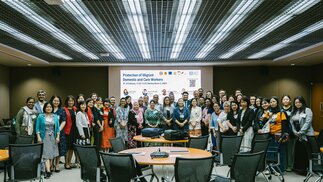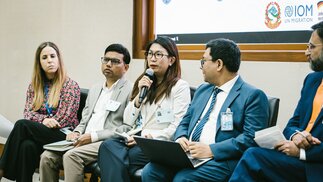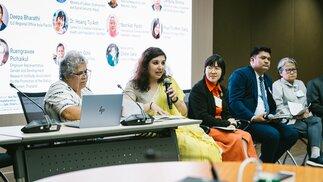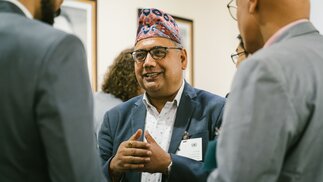Asia-Pacific Reviews Global Compact on Migration: Strengthening Policy, Protection, and Diaspora Engagement
Ahead of the Global Compact for Safe, Orderly, and Regular Migration (GCM) Regional Review for Latin America and the Caribbean Region from 19th to 20th March, we look back at the highlights of the GCM Regional Review for Asia that took place in Bangkok last month. Organised as part of the GCM’s global review process, the event set the stage for the International Migration Review Forum (IMRF) in 2026, highlighting critical migration challenges and strategies. The global programme “Shaping development-oriented migration” (MEG) hosted a key side event focusing on harnessing diasporas for development.


The MEG-led event titled Harnessing Diasporas for SDGs and GCM, co-hosted with the Nepali Ministry of Labour and the International Organisation for Migration (IOM), explored the critical role of diaspora communities in economic and social development. Governments of Pakistan, Micronesia, Bangladesh, and Viet Nam, along with diaspora organisations, discussed policies that maximise contributions from diaspora communities. These include national support structures, reintegration programmes, and digital services to facilitate engagement.
“The close relationship between countries and their diaspora is crucial,” said Micronesia’s Secretary of Justice, Leonito Bacalando Jr. “It helps mitigate brain drain, sustain families, and preserve cultural heritage.”Examples of successful diaspora-led initiatives were highlighted, including AVSE Global, which mobilises 10,000 Vietnamese experts worldwide to drive Vietnam’s Net Zero transition, and Nepal’s Non-Resident Nepali Association (NRNA), which supports disaster resilience and advocates for legal frameworks facilitating diaspora contributions. NRNA representatives noted a key challenge: the lack of comprehensive data on the Nepali diaspora, which hinders effective support mechanisms. Meanwhile, IOM’s regional emergency programmes showcased how diaspora engagement aids in crisis response, such as the Indonesian diaspora’s role in earthquake relief efforts in Turkey.


The Road Ahead
As the migration review process moves forward, MEG and its partners plan, capacity-building initiatives and to strengthen civil society networks ahead of the 15th Global Forum on Migration & Development Summit.
“Migrant voices must shape policy,” said William Gois of Migrant Forum Asia. “Social dialogue with all stakeholders is one of the most powerful ways to drive change.” With ongoing efforts to ratify international frameworks and enhance diaspora engagement, the Bangkok review set the foundation for advancing migrant rights, protection, and global migration governance.
It is important to recognise and empower migrants and their diaspora, so that they can realise their full potential – not only for themselves and the host communities, but also for the benefit of their countries of origin.